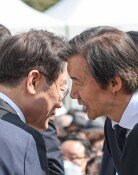Kim Jong Un’s message for change of situations
Kim Jong Un’s message for change of situations
Posted June. 19, 2021 07:19,
Updated June. 19, 2021 07:19
North Korean leader Kim Jong Un reportedly said in a Workers’ Party meeting that Pyongyang should be ready not only for dialogue but also for confrontation with Washington, emphasizing that it is supposed to be tightly prepared for the latter, in particular, according to North Korean state news media on Friday. “Our focus should stay on being responsive to fast-changing situations and keeping the state of affairs on the peninsula under stable management,” he said. It is the first official message from Kim since he kept silent for a long time following the Biden administration took office.
Although Kim mentioned both “dialogue” and “confrontation” while stressing the significance of “being tightly ready” for confrontation, it is a clear sign that he can make a turn toward a dialogue front given a series of his hostile responses. The North Korean leader defined the United States as the biggest foe early this year, since which Pyongyang has ignored any contact with Washington in silence. Suddenly, as he announced that Pyongyang had a thorough analysis of the U.S. administration’s policy, Kim detoured into implying a flexible approach by referring to the stable management of the state of affairs.
As Pyongyang may conclude internally that it is not able to endure the situation any longer by keeping the door to dialogue closed, Kim Jong Un attempts to make a change of situations by bringing up “dialogue” on the sly. Even on the first day of the North Korean ruling party’s meeting, he officially acknowledged that the regime has a hard time handling famine, saying that North Korean people are struggling to have access to food as last year’s typhoon affected the state’s grain production plan. The issue of making long-term preparations for a quarantine emergency situation was added to the agenda, implying that the regime’s extreme quarantine measures of closing borders to prevent COVID-19 have already reached their limitations.
Being pushed into a corner, Kim may pretend to be receptive to Washington’s appeasing gestures and make external appearances for the time being. However, chances are it may later focus on resolving imminent issues such as food shortages and COVID-19 vaccine supplies while gaining time by playing hard to get at the negotiating table for denuclearization. Behind the scenes, it may play a tug-of-war by threatening to carry out large-scale provocations while utilizing volatility in international politics in its interest.
Nevertheless, Pyongyang is not allowed anymore to use the tactic of “dialogue for dialogue” merely to overcome internal crises and extend the regime’s lifespan. The Biden administration already took a close look at the U.S.-North Korea dialogue that ended up three years ago in showy confrontation, dramatic transitions and disillusionment. Kim’s clichéd tactic of hopping from provocation to negotiation and vice versa will not work out again.







